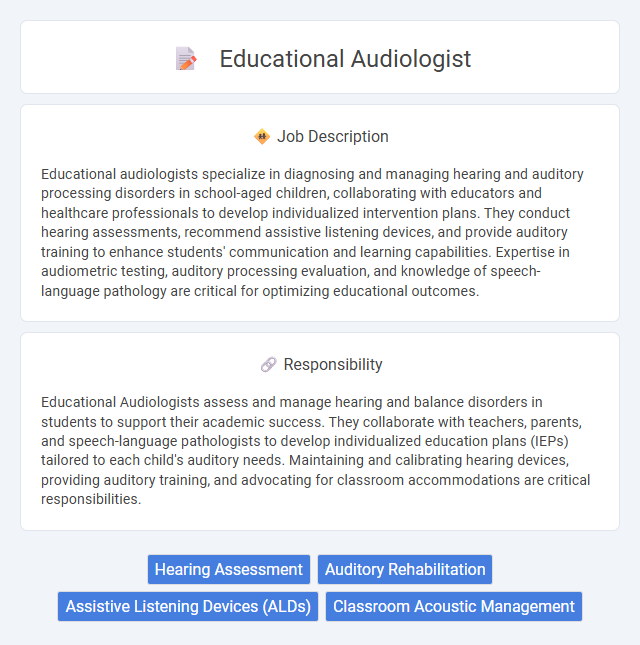
Educational audiologists specialize in diagnosing and managing hearing and auditory processing disorders in school-aged children, collaborating with educators and healthcare professionals to develop individualized intervention plans. They conduct hearing assessments, recommend assistive listening devices, and provide auditory training to enhance students' communication and learning capabilities. Expertise in audiometric testing, auditory processing evaluation, and knowledge of speech-language pathology are critical for optimizing educational outcomes.
Individuals with a strong interest in hearing, speech, and learning disorders are likely suitable for a career as an educational audiologist. Those who possess patience, excellent communication skills, and a passion for helping children with auditory processing difficulties will probably thrive in this role. Candidates without these traits or a background in audiology or education may find the job challenging and less fulfilling.
Qualification
An Educational Audiologist typically requires a master's or doctoral degree in audiology or a related field, along with state licensure or certification in educational audiology. Proficiency in assessing and managing hearing impairments in children, knowledge of auditory processing disorders, and experience with assistive listening devices are essential qualifications. Strong communication skills and collaboration with educators, speech-language pathologists, and families are critical for effective intervention and support in school settings.
Responsibility
Educational Audiologists assess and manage hearing and balance disorders in students to support their academic success. They collaborate with teachers, parents, and speech-language pathologists to develop individualized education plans (IEPs) tailored to each child's auditory needs. Maintaining and calibrating hearing devices, providing auditory training, and advocating for classroom accommodations are critical responsibilities.
Benefit
Educational audiologists likely improve students' access to learning by identifying and managing hearing impairments in educational settings. Their expertise probably enhances individualized support plans, leading to better academic performance and communication skills. Schools employing educational audiologists may experience a more inclusive environment that fosters student engagement and success.
Challenge
The role of an Educational Audiologist likely involves addressing complex communication barriers in diverse learning environments, which can be challenging. It often requires adapting assessments and interventions to meet the unique needs of students with hearing impairments. Navigating collaboration among educators, parents, and healthcare providers might pose additional difficulties in ensuring effective support.
Career Advancement
Educational audiologists specialize in assessing and managing hearing and auditory processing disorders in educational settings, facilitating improved student learning outcomes. Career advancement opportunities include roles such as lead audiologist, clinical supervisor, or educational services director, often requiring additional certifications or a doctoral degree (Au.D.). Pursuing advanced professional development and leadership training enhances prospects for higher-level administrative positions within school districts or healthcare organizations.
Key Terms
Hearing Assessment
Educational audiologists specialize in conducting comprehensive hearing assessments to identify auditory processing issues in students. They utilize advanced diagnostic tools such as audiometers and otoacoustic emissions (OAE) equipment to evaluate hearing thresholds and auditory function. Accurate hearing assessments guide intervention strategies to enhance communication and learning outcomes for children with hearing impairments.
Auditory Rehabilitation
Educational audiologists specializing in auditory rehabilitation provide critical support to students with hearing impairments by assessing and managing auditory processing challenges. They implement tailored intervention plans that improve speech perception, listening skills, and overall communication abilities in educational settings. Collaboration with teachers, speech therapists, and families ensures effective auditory habilitation, promoting academic success and social integration for hearing-impaired students.
Assistive Listening Devices (ALDs)
Educational audiologists specialize in the evaluation and implementation of Assistive Listening Devices (ALDs) to enhance auditory access for students with hearing impairments. They conduct hearing assessments, recommend appropriate ALDs such as FM systems or infrared systems, and collaborate with educators to integrate these technologies into the classroom setting. Their expertise ensures that students receive tailored auditory support, promoting improved communication and academic success.
Classroom Acoustic Management
Educational audiologists specialize in assessing and managing classroom acoustic environments to enhance speech intelligibility and learning outcomes for students with hearing challenges. They conduct acoustic assessments, recommend soundfield amplification systems, and implement noise reduction strategies to minimize background noise and reverberation in educational settings. These professionals collaborate with educators to design acoustic modifications that support auditory access and inclusive learning for all students.
 kuljobs.com
kuljobs.com